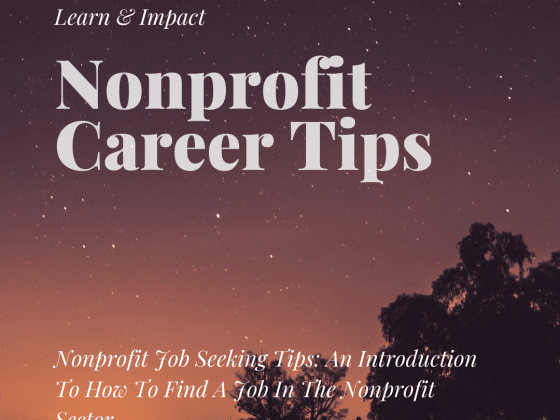The nonprofit sector is a rewarding and exciting sector in the United States. Nonprofit organizations represent 5.7% of the entire US economy and over 10.2% of all entities in the United States are nonprofit. Thus, the nonprofit sector is a large and very healthy industry that provides significant employment opportunities. In fact, the total US nonprofit annual revenue is $2.62 trillion, a very sizable amount.
Ok, let’s start with the benefits of working in the nonprofit sector:
(1) They are attractive to work at because they are mission-driven and offer the rewarding positive satisfaction of helping others (or impacting an area) while working at them.
At a nonprofit, foundation, association, union, or educational institution (some of the largest organization types in the nonprofit sector) you can work for a mission and cause that you care about or can get behind. And because of this, during the job-seeking stage nonprofit employers expect you to offer more than just a resume and experience match. To secure a position you will need to demonstrate an experience fit for the exact role including relevant prior work, an interest to work in the position long-term, and a proven and sincere passion for their mission. Even your outside volunteer activities all matter to nonprofit employers. Bottomline: nonprofit employers and hiring managers are looking for people who care about their purpose as much as they do and can do the work. They also seek employees who are hard-working, value diversity, equity, inclusion, and can successfully work with diverse groups of people.
(2) Another Big Benefit Are “The People” In the Sector.
Nonprofits are progressive, open to change, and care about our communities; where else can you find this? In general, nonprofit employers truly care about their staff and are normally open to committee decision making. This is different than at for-profits. For-profit companies are top down only decision makers (traditionally) and normally do not “discuss” their executive decisions openly before they are made in the same way. This is a great strength but also a great challenge. For this reason, expect the hiring process to take a bit longer. The decision-making process and planning approval process differs from the corporate sector. While the process is time intensive, it also offers stability, reliability, and employee buy in. Thus, if it is your first time in the sector officially make sure to follow and honor the organizational process prior to pushing your past workflow patterns on others. Get to know the people you work with, and then optimize your work to get the best results.
Remember also that executive nonprofit leadership are generally responsible (at least partially) to boards, or committees. Thus, seek to make wise decisions that others have also had the time to buy in on. This can include the need at times to justify their decisions with data to evidence wise decision making.
Another benefit or area of difference in seeking work in the nonprofit sector is that it allows us/you to passionately express your significant devotion to an area of work without appearing like a “fanatical jobseeker.” The nonprofit sector is looking for a pattern of passion, work, and volunteering in their mission or area of focus. Conversely, some corporate employers at times are more skeptical of job candidates too overly engaged in their brand out of fear that they also bring unprofessional behavior, unrealistic expectations, or do not understand professional boundaries.
(3) Your Work And Current Activities Matter.
In the nonprofit sector explaining your connection to the organization and any experience you have had following them, volunteering for them, or actively be a part of their community is a positive if do so professionally.
If you approached a for-profit with as much direct experience as many nonprofit jobseekers do, you would probably be labeled a stalker or out for personal gain. Honestly, try telling a Finance Director at Gap Inc., that you watched them speak at a recent event, that you volunteered at their two last gala/events, met their personal assistant at an art show last week, read the last three publications they had written, that you are very devoted what they do, and really want to work with them. They will be either terrified of you, label you as desperate, or be skeptical that your interest is not sincere or too good to be true.
Nonprofits are different. You are expected to network in their area of expertise, read their publications, meet their employees, and volunteer at their events. In fact, that is the fastest way to get hired at one. Show your dedication and ability to do the exact work you are interested in.
Unlike for-profit corporations, the information you need to secure a job lead (gain volunteer experience or meet the organizations leadership) is publicly available in the nonprofit sector. In the nonprofit world it is much better publicized when their events are, and how to get involved with an organization. Each of these are opportunities to (meet their leadership) get your foot in the door and volunteer with them. So, go to their website and social media, and you will find many doorways into their events and programs. Information on how to volunteer, and even the Executive Director’s email is normally located publicly as part of fulfilling their mission.
For better or worse, finding the best job for you often comes down to having the right work experience and then meeting the right people. Maintaining relationships from your past jobs, past internships, and your volunteer experiences is vital. No matter the position or level, seek to impress the organization you work with and expand your network. Also, make sure to ask questions about how they we able to get their job and share your interest in their organization and work that they do.
The Challenges of Nonprofit Job Seeking
(1) Finding an entry point. Many job seekers feel they have skills that should qualify them to work at a nonprofit, but many do not. Find ways to gain immediate volunteering and real tangible pro-bono experience on your resume to show your experience and passion for working in the sector. Any level of volunteering can help to build your nonprofit resume. If you don’t know where to start, consider seeking help from the Volunteer Match, or Board Match to gain some valuable nonprofit experience. Joining a nonprofit board can also be a powerful way to gain leadership experience in the sector.
(2) Finding the position you are right for and sticking with it. If you can choose a position/department that you are interested in and stick with it you will always be employed. Many job seekers interested in nonprofit work say, “I would be great at event planning, fundraising, or program management,” but later only stay in these positions (if they can get them) for two to three years. This, also applies to other nonprofit positions that are challenging and competitive. Take Development Directors for example, why are they so in demand? This is because most people do not stay in the area, and burnout is very high in these high pressure nonprofit roles. Also, as organization continually wish to grow, many time organizational fundraising expectations continually increase the longer staff are in the roles. Add in the fact that proving a background of fundraising success in not easy to achieve and generally required to get the job.
The key to ensuring long-term employability in the sector is to find a position/area/role that is match for your skills, experience, working hard to achieve organizational goals and sticking with it. This is the key to your professional success and it is also your hardest decision. Don’t try to switch from development to programs unless you can show your abilities on your resume that truly qualify you and you have the needed experience. Similarly, do not attempt to go from administrative to marketing unless you can demonstrate past experience on your resume in the work you accomplished and have the needed volunteer or past experience. These leaps between departments can be hard to pull off unless you gain relevant experience in their area you want to work in. It is that simple. So, first decide what you want to do today and start working in it; if you don’t have enough experience in it to get paid yet; volunteer. If you want to be senior executive and are not working in that level of role currently, consider joining a board or committee. Now is the time to gain the work experience to qualify you for the job you dream of. Do not wait.
(3) Choosing and sticking to a general area of interest and overall mission or niche within the nonprofit sector.
-Jobseekers everyday are surprised when they are not selected for an opportunity, and may have come in second or third in the interview process.
-I would say 8 out of 10 times it is because another person had prior exact industry experience in the position.
-So, if you are working in education, stay in education, if you are working in a religious organization stay in what you know.
-Of course people also get board and need change. This is the biggest challenge in nonprofit job-seeking: finding an area that you like and sticking to it.
-Remember you are most qualified for working in the area you are currently in, so choose wisely the positions and roads you enter.
(4) In the nonprofit sector we are very diverse in ethnicity, but not always diverse in beliefs within each organization. This can be limiting in some ways.
-Since we are mission driven entities and most nonprofits hire individuals that morally agree with their actions, this can limit our expose to outside beliefs and competitive information.
-Organizations hire individuals aligned with their mission, and normally do not hire disinterested perspectives.
-This is also why having an active board is so important for nonprofits, and also why we hear in the recruiter sector “I don’t want a yes person,” from executive directors.
-This problem does not exist as much for the for-profit sector. Disinterested perspectives and stockholders are actually required for may many larger for-profit corporations.
(5) Understanding the truths behind some of the myths of the nonprofit sector is also a challenge and can prove very helpful. Here a few that are talked about quite a bit:
Myth (1): No one that works in a nonprofit makes any money. This just not true at all, in fact over $670 billion dollars are earned by employees at nonprofit organizations each year and one in ten Americans work in the nonprofit sector. It is a growing sector in the US.
Myth (2) Working for a nonprofit is not a path that is a full career. In reality, the nonprofit sector provides many people with a lifetime of exciting work. Nonprofits also tend to offer young people more leadership opportunities than other sectors. Plus, incredible leadership experience is gained in the nonprofit sector.
Myth (3) Everyone that works in the nonprofit sector is nice. Though the sector is filled with many happy and nice people, it is also filled with difficult personalities, big egos, and office politics as well.
Myth (4) The nonprofit sector is not competitive at all. Organizations compete with each other all the time for donations, funds, grants, and even on certain issues. Organizations may also have missions that are in direct opposition to one another (such in the case of local environment/local development). You have to be competitive as jobs seeker as well, and make sure to market yourself fully and honestly.
Myth (5) Working for a nonprofit is just like volunteering, this in not true. Nonprofits rely on volunteers however they are often shielded from the organizational, financial, or issues relating to time working in the field.
Myth (6) Working in the nonprofit sector is easier and less intense as the for-profit sector. Also not true. If you are looking for a career change to have a better work life balance, some positives do exist in the nonprofit sector. Many of the jobs are not more than 50 hours weekly, but most all are highly demanding jobs in which staff must work hard, and on many different projects or in complex positions as many organizations are stretched for resources. The nonprofit sector is not a escape for candidates seeking easier jobs. In fact, nonprofit teams are so passionate about their work they traditionally work harder for their cause then they ever have before. Afterall, isn’t that why we do mission-driven work? We think so. The impact we can make in the nonprofit sector is extremely fulfilling but it is not for individuals that do not want do real work.





